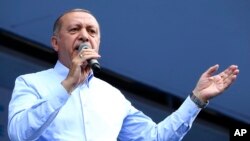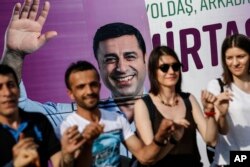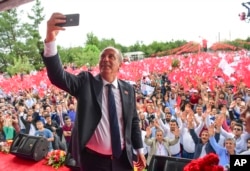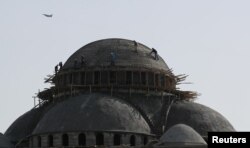Turkish President Recep Tayyip Erdogan has announced a military offensive against Kurdish separatist headquarters in Iraq. The action comes as Erdogan targets nationalist voters in elections later this month.
“Qandil will not be a threat, a source of terror, for our people anymore. We will drain the terror swamp in Qandil,” Erdogan said during an election rally Monday.
The mountainous Qandil region in northern Iraq is where the leadership of the PKK rebel group has been running a decades-long insurgency for Kurdish autonomy in southeast Turkey.
Since Monday, Turkish jets have been pounding the Qandil area, but there are no reports of a ground operation.
A successful military operation would likely boost Erdogan’s flagging campaign. Opinion polls suggest Erdogan's lead is slipping and that he will fail to win the June 24 vote by an absolute majority, forcing a run-off.
Erdogan’s campaign is now focusing on consolidating the Turkish nationalist vote. The president has also stepped up his rhetoric against the legal pro-Kurdish movement.
At the rally, Erdogan declared he would be ready to sign a death warrant for Selahattin Demirtas, the former leader of the pro-Kurdish HDP. Demirtas is running for the presidency from jail, where he is held on terrorism charges.
“Erdogan says he is going to have me executed if he is elected. It is the year 2018 and look at the election promise made by Turkey’s presidential candidate to voters,” Demirtas said on Twitter.
Erdogan’s courting of Turkish nationalists coincides with his chief presidential rival, Muharrem Ince, reaching out for the Kurdish vote. On Monday, Ince drew tens of thousands to a rally in Diyarbakir, the main city in the predominantly Kurdish southeast.
“Does (Erdogan) want to solve the Kurdish problem or not? I do,” said Ince. “It is a problem of political ethics as much as it is a cultural, economic and democratic one.”
Ince promised a new peace process under the auspices of parliament. He also pledged support for mother tongue education, a vital Kurdish demand.
The large turnout for Ince in Diyarbakir and his electoral promises are seen as groundbreaking. Ince’s main opposition CHP is traditionally viewed with deep suspicion by many Kurds.
While the CHP is a center-left party, it has a dominant nationalist wing that has opposed many Kurdish concessions. Ince’s platform of inclusivity, however, appears to be breaking down barriers, said Sinan Ulgen, the head of the Istanbul-based Edam research group.
“What he (Ince) did as the first step in his campaign was important, to visit imprisoned pro-Kurdish leader Selahattin Demirtas, which was to essentially try to woo (the) pro-Kurdish vote, which traditionally votes for AKP and HDP,” said Ulgen. The AKP is the ruling party in Turkey.
The Kurdish vote, which is about a fifth of the electorate, is usually split evenly between the HDP and Erdogan’s AKP. Analysts point out that for Ince to have any chance of defeating Erdogan in any second-round vote, he would need HDP voters.
Unofficial cooperation between CHP and HDP in parliamentary elections, due to be held simultaneously with presidential polls, could give Ince further impetus. “There is growing evidence to suggest CHP voters are strategically dividing their votes between CHP and HDP to ensure the HDP enters parliament,” said analyst Atilla Yesilada of Global Source Partners.
According to polls, HDP is hovering around the 10 percent voting threshold needed to enter parliament. The success of the pro-Kurdish party is seen as key to opposition efforts to oust the AKP.
Ince’s overture to Kurdish voters may have caught Erdogan off guard. Erdogan had introduced some Kurdish cultural reforms and presided over two failed peace processes with the PKK, which the Turkish government considers a terrorist organization.
Last month, a senior presidential adviser, Ilnur Cevik, suggested after the elections the possibility of a resumption of a peace process. Erdogan’s spokesman, Ibrahim Kalin, immediately dismissed the idea.
Observers in the past often portrayed Erdogan as the only man capable of bringing peace, a belief that could persist. "I observed that some Kurdish circles, both ruling party sympathizers and the HDP, seem to be hopeful about the possibility of a new beginning with Erdogan," wrote political columnist Nuray Mert for Turkey’s Hurriyet Daily News. “I think that some Kurds are still receptive to the ruling party’s indirect propaganda which I call the ‘propaganda of whisper,’” Mert added.
Erdogan, however, has presided over a military crackdown on the PKK in the past 18 months. It has turned many city and town centers into rubble across southeastern Turkey.
“There are words, and there are deeds,” analyst Yesilada said. “To persuade them (the Kurds) that AKP will be kind to them will be difficult. There is a regional survey which (was) only conducted in provinces with only Kurdish majorities in the second round, irrespective of who faces Erdogan. Erdogan’s vote is down to 15 percent.”
The HDP is equally emphatic. “Unless the Erdogan government is replaced by a democratic government, there can be no peace process,” said Ertugrul Kurkcu, honorary HDP president and deputy. “Without democracy for all Turkey, there is no peace for Kurds. There are no expectations; this will kill our party to expect something from Erdogan.”







